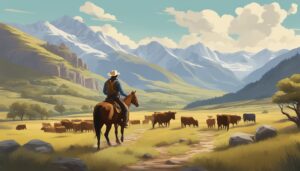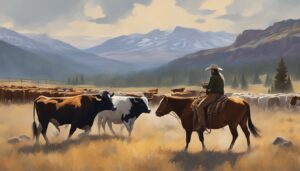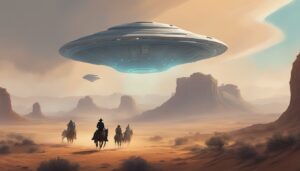TV Westerns have experienced a resurgence in popularity, with shows like Yellowstone and The Son captivating audiences with their gritty portrayal of the American frontier. Both series offer compelling narratives set against the backdrop of vast landscapes and complex family dynamics.
Yellowstone, created by Taylor Sheridan, follows the Dutton family’s struggles to maintain control of their sprawling Montana ranch. The show has garnered widespread acclaim for its intense drama and stellar performances. Yellowstone edges out The Son as the better TV Western due to its contemporary setting, which allows for a unique blend of modern conflicts and traditional Western themes.
The Son, based on Philipp Meyer’s novel, explores the multi-generational saga of the McCullough family in Texas. While it provides a rich historical perspective spanning from the 1800s to the 1900s, it lacks the immediate relevance and cultural impact of Yellowstone. Both shows offer strong performances and intricate plotlines, but Yellowstone’s ability to resonate with current audiences gives it a distinct advantage in the realm of TV Westerns.
Series Overview

Yellowstone and The Son represent two prominent modern Western dramas that have captured audiences with their compelling narratives and strong production values. Both series explore themes of family, power, and the changing American West.
Synopsis of Yellowstone
Yellowstone follows the Dutton family, led by patriarch John Dutton (Kevin Costner), as they fight to maintain control of their vast Montana ranch. The series depicts conflicts with land developers, Native American reservations, and internal family struggles.
Set against the backdrop of stunning Montana landscapes, Yellowstone blends modern cowboy culture with high-stakes business dealings and political maneuvering. The show explores themes of legacy, loyalty, and the clash between tradition and progress.
Yellowstone has spawned two prequel series: 1883 and 1923, expanding the Dutton family saga across different time periods.
Synopsis of The Son
The Son, based on Philipp Meyer’s novel, chronicles the multi-generational saga of the McCullough family in Texas. The series alternates between two timelines: young Eli McCullough’s experiences with Comanche Indians in the 1850s and his later life as a powerful cattle baron in 1915.
Pierce Brosnan stars as the elder Eli McCullough, portraying a ruthless patriarch willing to do whatever it takes to build and protect his empire. The Son examines the violent birth of America through the lens of the Texas oil boom and the Mexican Revolution.
The series delves into themes of cultural conflict, moral ambiguity, and the cost of ambition across multiple generations.
Creators and Production
Taylor Sheridan, a former actor turned filmmaker, created Yellowstone. Known for his neo-Western screenplays, Sheridan brings authenticity and gritty realism to the series. Yellowstone is produced by Paramount Network and has become their flagship show.
The series features high production values, with much of it filmed on location in Montana and Utah. Sheridan’s hands-on approach extends to directing episodes and even running “cowboy camp” for the actors.
The Son was developed for television by Meyer, Brian McGreevy, and Lee Shipman. AMC produced the series, which ran for two seasons. The show’s dual-timeline structure presented unique production challenges, requiring careful attention to period details in both the 1850s and 1915 settings.
Setting and Historical Context

Yellowstone and The Son both transport viewers to distinct American frontiers, showcasing the rugged landscapes and historical complexities of Montana and Texas respectively. Their settings play crucial roles in shaping the narratives and characters.
Depiction of Montana and Texas
Yellowstone immerses viewers in the vast, untamed beauty of Montana. The show’s sprawling ranch landscapes capture the essence of Big Sky Country, with snow-capped mountains and expansive prairies. This setting reflects the state’s ranching heritage and ongoing land conflicts.
The Son, in contrast, unfolds across the sun-baked plains of Texas. It portrays the state’s transition from a wild frontier to an oil-rich powerhouse. The arid, dusty terrain serves as a backdrop for the McCullough family saga, spanning multiple generations.
Historical Accuracy and Interpretation
Yellowstone blends modern ranching practices with historical elements. It touches on issues like Native American land rights and the legacy of Western expansion. The show’s depiction of the Dutton ranch incorporates authentic period details alongside contemporary amenities.
The Son delves deeper into historical events, covering Texas’s transformation from the 1850s to the 1910s. It explores the impact of the transcontinental railroad, oil discovery, and changing relations between Anglo settlers, Mexicans, and Comanches. The series aims for historical authenticity in its portrayal of 19th-century Texas life and conflicts.
Critical Reception and Popularity

Yellowstone and The Son have both made significant impacts in the Western TV genre, garnering attention from critics and viewers alike. Their reception, ratings, and cultural influence have shaped the landscape of modern television dramas.
Ratings and Reviews
Yellowstone has achieved massive popularity, consistently drawing high viewership numbers. The show’s ratings have grown substantially since its debut, with later seasons attracting over 10 million viewers per episode. Critics initially gave mixed reviews, citing pacing issues in early seasons.
The Son received generally positive reviews for its first season, with praise for Pierce Brosnan’s lead performance. However, it didn’t match Yellowstone’s viewership levels. Critics appreciated The Son’s historical approach and complex narrative.
Both shows have been compared to other acclaimed dramas like Succession and Justified for their family dynamics and intense conflicts.
Cultural Impact
Yellowstone has become a cultural phenomenon, sparking renewed interest in Western-themed entertainment. The show has influenced fashion trends, with viewers emulating the characters’ cowboy attire.
The Son, while less widespread in its impact, contributed to discussions about Texas history and the complexities of frontier life. It shed light on lesser-known aspects of the American West.
Both series have prompted debates about land ownership, family legacies, and the changing face of rural America. They’ve also increased tourism to their respective filming locations.
Award Nominations and Wins
Yellowstone has received numerous award nominations, particularly for its acting performances. Kevin Costner won a Golden Globe for Best Actor in a Drama Series in 2023.
The show has also been recognized for its cinematography and production design. Despite its popularity, Yellowstone has faced some criticism for limited Emmy nominations.
The Son earned Pierce Brosnan a Golden Globe nomination for Best Actor in a Television Series Drama. The show’s costume design and historical accuracy have also been praised.
Both series have contributed to the resurgence of Western dramas in award conversations, competing against contemporary settings more common in prestige television.
Themes and Storytelling

“Yellowstone” and “The Son” explore complex family dynamics, moral ambiguity, and the struggle for survival in the American West. Both shows weave together themes of legacy, power, and adaptation against harsh frontier backdrops.
Family Legacy and Conflict
The Dutton family in “Yellowstone” and the McCullough clan in “The Son” form the cornerstones of each series. Their multi-generational sagas showcase the weight of inheritance and the price of ambition. John Dutton fiercely defends his sprawling Montana ranch, while Eli McCullough builds a Texas oil empire.
Family loyalty clashes with individual desires, creating tension and drama. Siblings vie for power and parental approval. The shows depict how family bonds can be both a source of strength and a suffocating burden.
Secrets and betrayals add layers of intrigue to family relationships. Characters grapple with the consequences of their ancestors’ actions, shaping their own moral compasses.
Law, Order, and Morality
Both series blur the lines between right and wrong in frontier settings. Characters often operate in moral gray areas, making difficult choices for survival or gain.
Law enforcement plays a complex role. In “Yellowstone,” the Duttons’ influence over local authorities raises questions of justice and corruption. “The Son” explores how the rule of law evolves in a changing Texas.
Violence is a recurring theme, used as a tool for maintaining power and resolving disputes. The shows examine the psychological toll of this brutality on characters and communities.
Ethical dilemmas force characters to choose between personal benefit and broader societal good. These choices reveal deeper truths about human nature and the foundations of civilization.
Survival and Adaptation on the Frontier
The harsh landscapes of Montana and Texas serve as more than backdrops – they’re active forces shaping character development. Both shows depict the physical and mental toughness required to thrive in unforgiving environments.
Economic pressures threaten traditional ways of life. The Duttons fight to preserve their ranching legacy against modern encroachment. The McCulloughs navigate the transition from cattle to oil, adapting to changing times.
Indigenous peoples’ struggles are portrayed in both series. “Yellowstone” features conflicts with Native American tribes, while “The Son” explores the violent history between settlers and Comanches.
Characters must evolve or perish as their worlds change. This theme of adaptation resonates in personal relationships, business dealings, and cultural clashes throughout both shows.
Character Analysis

Both Yellowstone and The Son feature intricate character development that drives their narratives forward. The shows excel at crafting multifaceted individuals who blur the lines between hero and villain.
Complex Protagonists and Antagonists
John Dutton, portrayed by Kevin Costner in Yellowstone, embodies the archetypal Western patriarch. His unwavering dedication to preserving his family’s legacy often leads to morally ambiguous decisions. The show explores John’s inner conflicts as he balances personal relationships with the harsh realities of maintaining power.
The Son’s Eli McCullough, played by Pierce Brosnan, shares similarities with John Dutton. Both characters are ruthless in protecting their interests, yet display moments of vulnerability. Eli’s journey from captive to cattle baron showcases the complexity of survival and ambition in the American West.
Supporting Characters’ Development
Yellowstone’s ensemble cast adds depth to the Dutton family saga. Beth Dutton’s fierce loyalty and sharp wit contrast with Jamie’s internal struggles, creating a dynamic family dynamic. The show delves into the motivations of antagonists like Thomas Rainwater, presenting nuanced perspectives on land rights and cultural preservation.
The Son similarly invests in its supporting characters. Pete McCullough’s idealism clashes with his father’s brutal pragmatism, while Jeannie’s storyline explores gender roles in a changing society. Both series use their extended casts to examine themes of loyalty, betrayal, and the cost of power in the American West.
Production Quality

Both “Yellowstone” and “The Son” showcase impressive production values that elevate the neo-western genre on television. These shows demonstrate a commitment to visual storytelling and immersive audio experiences.
Cinematography and Scenic Views
“Yellowstone” sets a high bar for visual quality in Western TV dramas. The show’s cinematography captures Montana and Utah’s landscapes with stunning precision. Wide shots of vast prairies and rugged mountains create a sense of grandeur, rivaling big-budget films.
“The Son” also delivers strong visuals, though on a slightly smaller scale. Set in Texas, it offers a different but equally compelling aesthetic. The show’s cinematography highlights the stark beauty of the Lone Star State, from dusty plains to oil-rich fields.
Both series use natural light and carefully composed shots to enhance their storytelling. They employ a mix of sweeping vistas and intimate close-ups to capture the essence of the American West.
Music and Soundtrack Contribution
“Yellowstone” features an evocative soundtrack that blends contemporary country, folk, and rock music. Original compositions by Brian Tyler create a distinct sonic identity for the show. The music enhances emotional moments and underscores the drama’s intensity.
“The Son” takes a more traditional approach to its score. Composer Nathan Barr crafts a soundtrack that incorporates elements of Western music and Texan folk traditions. The result is a sonic landscape that feels authentic to the show’s time period and setting.
Both series use music to great effect, though in different ways. “Yellowstone” leans more heavily on licensed tracks, while “The Son” relies primarily on its original score. These choices reflect each show’s unique tone and atmosphere within the neo-western drama genre.
Expansion and Spinoffs

The Yellowstone franchise has expanded rapidly, spawning multiple spinoff series that explore different time periods and characters within the Dutton family saga. These new shows have broadened the appeal and reach of the Yellowstone universe.
Complementary Series in the Same Universe
1883 serves as a prequel to Yellowstone, chronicling the Dutton family’s journey westward in the late 19th century. The series provides crucial backstory to the Dutton legacy.
1923 continues the family saga, focusing on an earlier generation of Duttons during Prohibition and the Great Depression. It stars Harrison Ford and Helen Mirren as Jacob and Cara Dutton.
Tulsa King, while not directly connected to the Duttons, exists within the same universe. It follows a New York mafia capo building a criminal empire in Oklahoma.
Potential for Future Spinoffs
Yellowstone creator Taylor Sheridan has ambitious plans for expanding the franchise further. New spinoffs in development include:
The Madison: Set to star Michelle Pfeiffer, this series will likely explore another branch of the Dutton family tree.
6666: Focusing on the legendary Four Sixes Ranch in Texas, this spinoff promises to delve deeper into the modern ranching world.
Lioness, though not directly tied to Yellowstone, is another Sheridan creation that will expand his TV empire. It centers on a CIA program training female operatives.
Comparative Analysis
Yellowstone and The Son both depict powerful family empires in the American West, but they differ in key aspects of their storytelling, audience appeal, and genre elements.
Viewership and Fan Base Comparison
Yellowstone has achieved massive popularity, consistently drawing millions of viewers per episode. The show’s success has led to multiple spin-offs, expanding the Dutton Ranch universe. Its fanbase spans diverse demographics, attracting both traditional Western enthusiasts and new audiences.
The Son, while critically acclaimed, had a more niche viewership. It appealed primarily to history buffs and fans of literary adaptations. The series concluded after two seasons, whereas Yellowstone continues to grow its audience with each new season.
Both shows have garnered praise for their lead actors’ performances, with Kevin Costner and Pierce Brosnan bringing star power to their respective roles.
Genre-Specific Comparisons
Yellowstone embraces a neo-Western style, blending modern issues with traditional Western themes. It focuses on present-day conflicts surrounding land rights, Native American relations, and corporate interests. The show’s contemporary setting allows for exploration of current social and political dynamics.
The Son takes a different approach, presenting a multi-generational saga spanning from the 1800s to the 1900s. It delves deeper into historical aspects of the American West, including the Texas oil boom and conflicts with Mexico.
Both series explore family legacies and the moral compromises made to maintain power. Yellowstone’s Dutton Ranch serves as a central character, while The Son’s McCullough oil empire drives its narrative.
The shows differ in their pacing and tone. Yellowstone often features high-stakes action and dramatic confrontations. The Son adopts a more measured pace, emphasizing character development and historical context.
Conclusion

Both Yellowstone and The Son offer compelling takes on the modern Western genre, each with its own strengths and appeal to viewers.
Final Thoughts on Yellowstone vs The Son
Yellowstone delivers gripping family drama and power struggles set against the backdrop of Montana’s rugged landscapes. Its cinematic visuals and star-studded cast, led by Kevin Costner, have helped make it a ratings juggernaut.
The Son takes a different approach, spanning multiple time periods to explore the origins of a Texas oil dynasty. Pierce Brosnan’s nuanced performance anchors the show’s examination of the American West’s violent history.
While Yellowstone focuses on present-day conflicts, The Son provides historical context. Yellowstone excels in action and high-stakes confrontations. The Son delves deeper into character development and moral ambiguity.
Ultimately, viewers’ preferences will determine which show resonates more. Fans of fast-paced modern Westerns may favor Yellowstone. Those seeking a more contemplative historical drama might prefer The Son.



